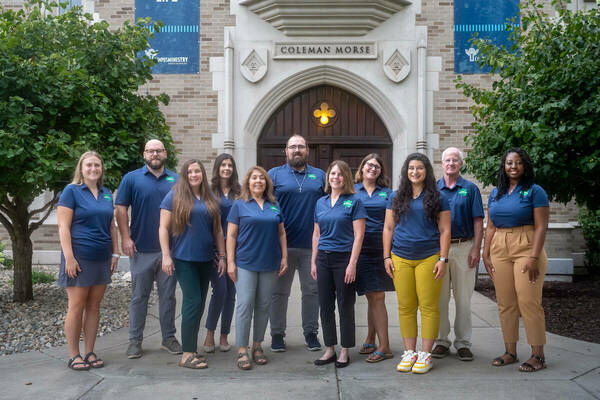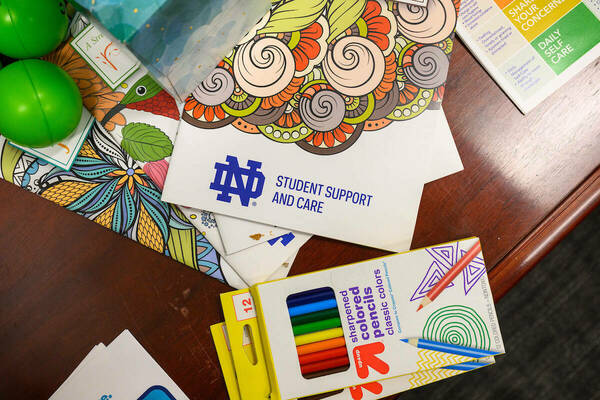A mission-driven approach to improving accessibility
As an undergraduate student at Albion College, Brent Fragnoli had dreams of becoming a military chaplain. More than anything else, he knew he wanted to use his life to help people. God had different plans for Fragnoli’s profession, but he’s still living out his purpose.
Today, Fragnoli is a staff member and adjunct professor at the University of Notre Dame. He serves as a care and wellness consultant with a specialization on prevention and outreach at the Center for Student Support and Care in Student Affairs. In this role, he partners with colleagues across campus to increase retention, well-being, and support for students on campus. He also has a specific focus on supporting students who are returning from a leave or withdrawal and those with disabilities. Often, these populations are the same. The Center works with students in every academic program, from undergraduate education to professional and doctoral degrees.
Fragnoli is also entering his third semester of teaching the course “Abled in a Disabled World,” a partnership between the Center for Social Concerns and the College of Science. The course examines societal policies and systems that create a negative impact for the disabled community.
“I fell into this work by complete happenstance,” Fragnoli offers. But as someone who double-majored in religion and philosophy, he might also be the first to admit there was a hand guiding him to his work in disability advocacy. During a graduate assistant position in the Center for Autism at Oakland University, he quickly grew to love his work and realized that, working to make the world a more accessible and inclusive place not only helps individuals with disabilities, but has benefits beyond. “In my class, we often talk about the curb cut effect,” Fragnoli said, referring to the ramp that connects a sidewalk to a street. “[Enhancing accessibility is] not just better for chair users. It’s better for elderly people, parents pushing strollers, everyone. Everyone benefits from ease of access.”

He counts himself as fortunate to be involved in disability advocacy at Notre Dame because the work is reflected in the University’s mission. This creates more opportunities for partnerships and collaboration as staff and faculty are called to be more relational rather than transactional when it comes to the student experience. “I think it’s amazing at Notre Dame that we talk about the formation of our students and what makes this Notre Dame. Developing accessibility fits within that formation,” he said. “Sure, there’s our office (the Center for Student Support and Care, which includes the Sara Bea Accessibility Services Office), and we lead a lot of these things. But there’s a real ‘it takes a village’ mentality. Enhancing accessibility has become a prominent focus of other offices.”
Those other offices include Undergraduate Admissions, the Meruelo Family Center for Career Development, Facilities Design and Operations, Notre Dame Police Department (NDPD), and the Kaneb Center for Teaching Excellence. Thanks to the partnerships Fragnoli and his colleagues at the Center have established, there is proactive programming designed to help disabled students have a full and fulfilling Notre Dame education from the moment they’re being recruited to the milestone of interviewing for post-undergraduate employment.
This spring, during the Rally 2024 for admitted students, Admissions worked with the Center to make sure students with mobility impairments felt especially welcome. One important component was to have a campus tour conducted by a wheelchair user and a panel of current mobility impaired students along with access to the accessible seating section of the stadium so that students and their loved ones could learn firsthand how individuals with disabilities maneuver campus. There were also specific programs and events for them—scheduled in a way that didn’t conflict with other informational content that could help them explore campus life.
Of the eight attendees with mobility impairments attending one Rally event, seven confirmed their attendance at Notre Dame, Fragnoli said. Participants shared their delight at being so integrated into the programming and having the red carpet rolled out for them. “They told us other schools made them feel ‘othered,’” he said.
More broadly, when it comes to making campus easier to navigate, Facilities and NDPD have reached out to make Sara Bea Accessibility Services aware of construction or repairs that block a sidewalk. Sara Bea then ensures that students with mobility and vision impairments are notified. NDPD’s Parking Services has pulled the Center into its monthly parking meetings to help give students with access concerns a voice during those meetings.
The Center for Career Development is also working more closely with the Center for Student Support and Care to offer more career development resources for students with disabilities. In addition, the career center helps connect students with accessible job opportunities through on-campus employment and off-campus internships. Many of the off-campus opportunities are designed with individuals with cognitive, mobility, hearing, or visual impairments in mind.
Fragnoli has also worked with the Kaneb Center to increase awareness among faculty about what it means for a student to be neurodivergent in the classroom. The Kaneb collaboration also seeks to incorporate universal design in course development so that classes are more accessible to all students, regardless of ability.

With national estimates of more than one in four U.S. adults having some type of disability, Fragnoli believes disability advocacy “is almost like an investment in our future. The unique aspect about disability is that it is the most fluid of any identity. You can be disabled and become non-disabled, and you can be non-disabled and become disabled. It doesn’t matter your age, race, gender, sexual orientation, or affluence.”
As Fragnoli and his colleagues continue to establish partnerships with other units, Notre Dame’s leadership in support and care will grow. “This is what makes Notre Dame such a special place to work, study, or teach,” he said. “These partnerships to increase campus accessibility are created through our shared sense of mission, yet they are sustained through our devotion to fostering a sense of belonging for every member of our community.”
Resource: Tips for Interacting with People with Disabilities
Originally published by at diversity.nd.edu on July 25, 2024.
Latest Research
- University of Notre Dame and IBM Research build tools for AI governanceMain Building (Photo by Matt Cashore/University of Notre Dame) …
- Smarter tools for policymakers: Notre Dame researchers target urban carbon emissions, building by buildingCarbon emissions continue to increase at record levels, fueling climate instability and worsening air quality conditions for billions in cities worldwide. Yet despite global commitments to carbon neutrality, urban policymakers still struggle to implement effective mitigation strategies at the city scale. Now, researchers at Notre Dame’s School of Architecture, the College of Engineering and the Lucy Family Institute for Data & Society are working to reduce carbon emissions through advanced simulations and a novel artificial intelligence-driven tool, EcoSphere.
- Seven engineering faculty named collegiate professorsSeven faculty members in the Notre Dame College of Engineering have been named collegiate professors—a prestigious title awarded by the university and college in recognition of excellence in research, teaching and service. The designation may be conferred on faculty at the assistant, associate or…
- ‘A special challenge’: German studies scholar wins National Humanities Center fellowship for research on medieval womenFor CJ Jones, the joy of research is not the answers but the journey. And the next step on that journey is a fellowship with the National Humanities Center. …
- Notre Dame Lead Innovation Team partners with local WIC program to identify, prevent lead poisoning in childrenB.A.B.E. store “shoppers” now have something new to help their families: free lead screening kits offered by the University of Notre Dame’s Lead Innovation Team.
- Notre Dame Welcomes Ninth Cohort of Warrior-Scholars for Transformative Academic JourneyNOTRE DAME, IN – The University of Notre Dame recently concluded its ninth successful Warrior-Scholar Project (WSP) boot camp, hosting 34 dedicated Warrior-Scholars from June 21st to 28th. This intensive, week-long academic residency provided transitioning service members and veterans…













